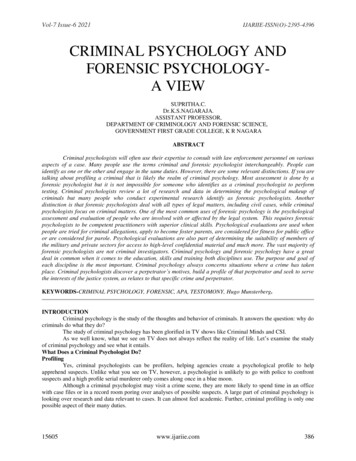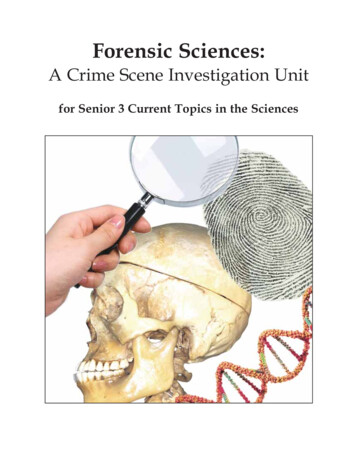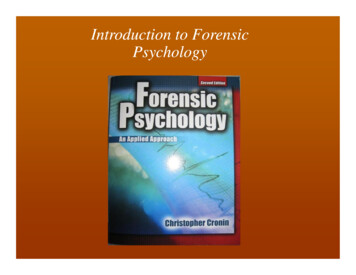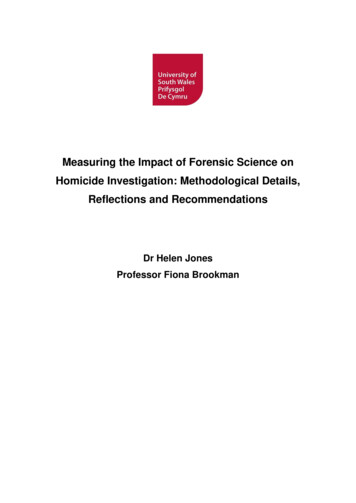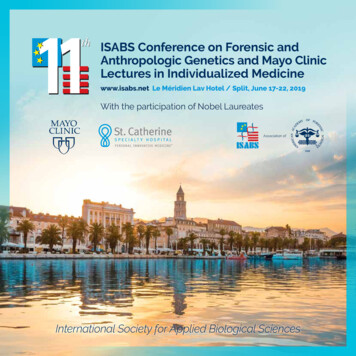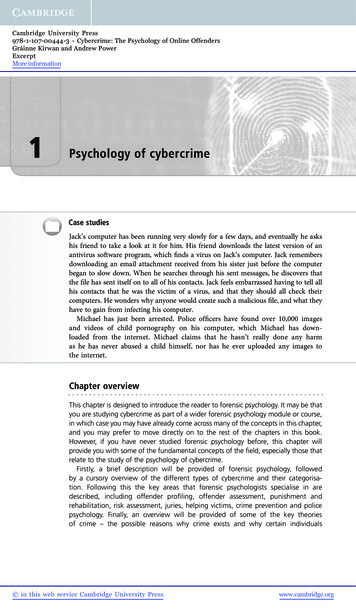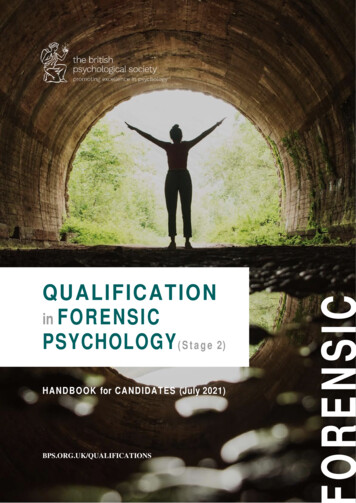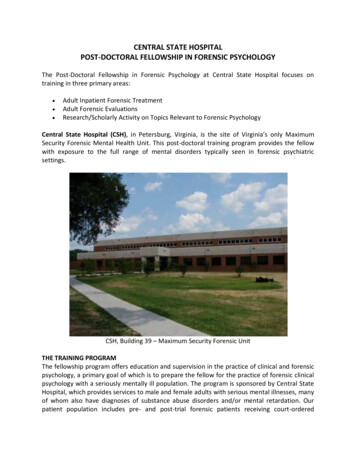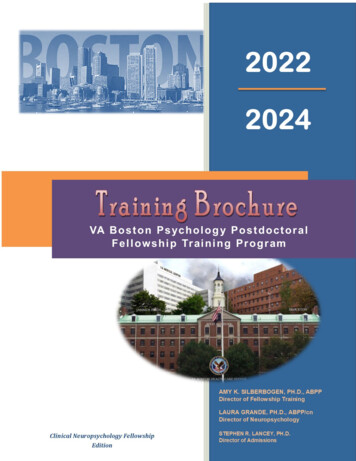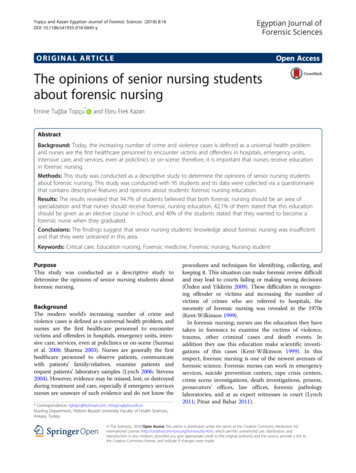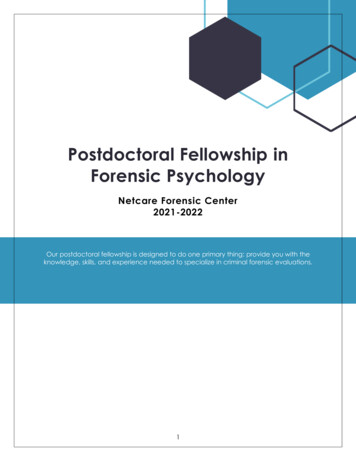
Transcription
Postdoctoral Fellowship inForensic PsychologyNetcare Forensic Center2021-2022Our postdoctoral fellowship is designed to do one primary thing: provide you with theknowledge, skills, and experience needed to specialize in criminal forensic evaluations.1
Postdoctoral Fellowship inForensic Psychology INTRODUCTION FROM THE TRAINING DIRECTORThank you for your interest in the Forensic Psychology Postdoctoral Fellowship at the Netcare Forensic Center.Our fellowship, which is approved for the American Board of Forensic Psychology’s postdoctoral experiencewaiver, emphasizes training that is informed by best practices - both conceptual and practical – that havebeen identified by professional consensus. The primary goal of our training program is to provide the necessaryknowledge and supervised experiences for fellows to develop specialized skills in the area of criminal forensicpsychology. In order to accomplish this goal, we provide a year-long sequence of closely supervised criminalforensic evaluation experiences designed to provide a conceptual foundation as well as practical, appliedskills necessary to prepare for, perform, and write comprehensive reports of criminal forensic evaluations.Additionally, we provide the option to interested fellows for supervised experiences in civil forensic evaluations,guardianship evaluations, and assessment of malingering in Netcare’s clinical settings.One of the things that I have always loved is solving puzzles, and I think the same is true of the psychologistswho work at the Netcare Forensic Center. The cases we do present complex and challenging puzzles in everysense of the word. In a legal sense, the defendants we see are charged with criminal activity from the lowestmisdemeanor all the way to capital murder, and it is not unusual for any one defendant to have multiplecharges spread out over a significant period of time. In a clinical sense, we see an amazing array of diagnosesrepresented, including the more typical psychotic and mood disorders, many of which are complicated bydrug and alcohol abuse. We also see atypical clinical issues (e.g., Capgras Syndrome, Post-ictal violence, etc.)that present fascinating learning opportunities for us. At a practical level, I like to think about this puzzle-solvingtask as further complicated by not always having all the puzzle pieces, where the ones that we do have aresometimes trying to fool us. Then there is the challenge of capturing all this in a well-written manner that ispersuasive, compelling, and makes sense to a non-clinical audience. These are the things that keep forensicwork invigorating for all of us, as we never know what unique clinical and legal complexities each new casewill present. If that sounds interesting to you, this just may be the Postdoctoral Fellowship for you.The Netcare Forensic Center’s Postdoctoral Fellowship accepts only applicants who have completed adoctoral program in psychology at an APA-accredited university or professional school. This fellowship is a yearlong, full-time position. In our view, it is important to contribute to the development of a professional workforcethat matches the diverse life experiences and backgrounds of the individuals on whom we perform forensicexaminations. To that end, we strongly encourage qualified individuals from underrepresented cultural, ethnic,sexual orientation, and geographical backgrounds to apply.Again, thank you for your interest in our fellowship program. This document is intended to provide a moredetailed description not just of our fellowship, but is also meant to convey a sense of what it might be like foryou to spend a year training with us. No written summary, no matter how comprehensive, can fully capture thedepth, breadth, and nuanced complexity of the work we do at the Netcare Forensic Center, nor could itpossibly anticipate every question or concern that an interested fellow might have about us. Recognizing suchlimitations, I welcome you to contact me at the e-mail address below so that I might discuss the goodness-offit between what we have to offer and what you seek in a fellowship. I look forward to hearing from you.Terry Kukor, Ph.D., ABPP (Forensic)Director of Postdoctoral Fellowship TrainingNetcare Forensic Centertkukor@netcareaccess.org2
Postdoctoral Fellowship inForensic Psychology Reasons to Choose NetcareQUICK FACTSThere are several things that we believe make the NetcareForensic Center a unique and great place to train: Salaried position with benefits including health and dentalinsurance, vacation time, sick leave, liability coverage, andaccess to free and low-cost continuing education courses. Flexible work schedule, including working from home Ability to work with and learn from a number of highly skilledand very experienced examiners with different interviewing,writing, and supervisory styles Supervisors work hard to maintain the delicate couraging autonomy during the final training year Fellows have the opportunity to pick and choose evaluationtypes and clinical presentations most interesting to them Evaluations take place in a variety of settings (e.g., jails,detention centers, inpatient units, our office), which providesan opportunity for fellows to gain confidence in a variety ofcontexts We love what we do! We are a tight-knit group of forensicpsychologists who are passionate about forensic psychologyand are committed to training highly skilled examiners Salaried staff includes two full-time psychologists who areboard certified in forensic psychology and several othersactively working toward board certification Emphasis on critical thinking includes examining biases andinformation that does not support your opinion, which helpsfellows develop the necessary skills to become an effectiveexpert witness As the sole fellow, you are given a fair amount of freedomand flexibility to structure the fellowship to meet your trainingneeds. While still a trainee, you are regarded by other staff asa colleague and are encouraged to take an increasinglyactive role in the cases on which you work, includingcorresponding with attorneys and collateral sources Completion of our training program qualifies for the ABFPexperience waiver. You will have a solid foundation to beginthe process of board certification Fellows who have student loans are eligible for the PublicService Loan Forgiveness (PSLF) program. Netcare also makesa monthly contribution toward student loan principal.3Full-time, year-long trainingin criminal forensicevaluation-CompetencyCriminal ResponsibilityIntervention in Lieu ofConvictionJuvenile CompetencyJuvenile BindoverAnd moreColumbus, OhioOutpatient Setting 45,000 stipendAAFP Experience WaiverEPPP Study MaterialsAvailableHigh degree of autonomywith ample supportEligible for PSLFProfessional LiabilityInsurance IncludedMonthly Student LoanPayment Contribution
Postdoctoral Fellowship inForensic Psychology Who We AreThe Site:Netcare is one of 10 designated forensic evaluation centers certified by the Ohio Departmentof Mental Health, Office of Forensic Services. Since the early 1970s when it was constituted asSouthwest Mental Health Center, Netcare Access (the parent corporation for the NetcareForensic Center) has provided assessment services for the Courts and Franklin County ChildrenServices. These assessments typically go well beyond the diagnosis and treatmentrecommendations offered in the behavioral health assessments performed outside of forensicservices. The Courts require clinical opinions about specific legal questions (e.g., competencyto stand trial) that must be formulated in such a way that both statutory questions and functionallegal capacities are fully addressed.The Netcare Forensic Center provides evaluations for 11 counties in the Central Ohio area,including Franklin (home to Columbus, the state capital), Delaware, Fairfield, Fayette, Hocking,Madison, Jackson, Licking, Pickaway, Ross, and Union Counties. Forensic evaluations are alsoconducted at the request of many of the Juvenile and Municipal Courts in our region, as wellas the Federal Courts located in Columbus.The People:The following individuals work at Netcare Forensic Center on either a full or part-time basis andsupervise the fellow: Terry Kukor, Ph.D., ABPP, is a licensed psychologist and board certified in forensic psychologyby the American Board of Professional Psychology. He is a Senior Forensic Psychologist andTraining Director. He holds adjunct faculty appointments in the Psychology Departments atDrexel University and Miami University, and in the Department of Psychiatry and BehavioralHealth at The Ohio State University. Dr. Kukor has specialized in criminal forensic evaluationfor more than 25 years, during which time he has performed a wide variety of forensicevaluations, including criminal responsibility, competence to stand trial, juvenile competency& waiver, violence risk assessment, and threat assessment. He is on the teaching faculty forthe American Academy of Forensic Psychology, and is a threat assessment consultant forWork Trauma Services Inc. He performs and supervises criminal forensic evaluations on courtreferred adults and juveniles, does fitness for duty evaluations for the Federal AviationAdministration, and consults with a regional office of the FBI. He is a past national Co-chair ofthe American Academy of Forensic Psychology CE Workshops. In 2019 he was recognizedwith the Distinguished Contributions to Forensic Psychology award by the ExecutiveCommittee of the American Academy of Forensic Psychology. Kara Predmore, Psy.D., is a Senior Forensic Psychologist and Assistant Training Director for thefellowship. She completed her graduate training at Wright State University in Dayton, Ohio,where she earned a Doctorate in Clinical Psychology. She has extensive experience workingwith children and adolescents having completed her predoctoral and postdoctoral trainingsat residential treatment centers on Long Island and the Chicagoland area, respectively. Dr.Predmore began her career in private practice in Columbus, Ohio. She was also previously4
Postdoctoral Fellowship inForensic Psychology employed at the Ohio Department of Youth Services, where in addition to providingpsychological services and evaluation to youth involved in the juvenile justice system, shewas involved in training staff on fundamentals of cognitive behavioral therapy. She has beenemployed full time at Netcare Forensic Center since 2011. Shannon Porter, Psy.D., is a licensed psychologist who earned a Doctorate from The ChicagoSchool of Professional Psychology. There, she was part of the inaugural graduating class ofthe Clinical Forensic Psychology program, and she specialized in law enforcement. Dr. Portercontinued her training in forensic assessment and evaluation during her predoctoralinternship and postdoctoral fellowship at Netcare Forensic Center, and she eventuallyaccepted a full-time position there. She has also worked at Twin Valley BehavioralHealthcare, where she helped create and implement an inpatient competency restorationprogram for individuals found incompetent to stand trial and court-ordered to undergoinpatient psychiatric treatment. Dr. Porter returned to Netcare Forensic Center full-time, andshe also continues to perform criminal forensic evaluations on a part-time basis throughoutthe state of Ohio. She was recently named the Assistant Director of Forensic Services, in whichshe provides administrative oversight and support to the Probate Pre-screening team andthe Family Psychological Assessment Services team. She will also continue to provide forensicservices. She has experience doing professional presentations for a variety of audiences (lawenforcement in particular), and she currently serves as a consultant to federal lawenforcement. She has a keen interest in threat assessment, and has obtained specializedtraining in that area. Meredith Veltri, Ph.D., ABPP, is a licensed psychologist and board certified in forensicpsychology by the American Board of Professional Psychology. She completed her graduatetraining at Sam Houston State University, where she earned a Master’s and Doctorate inClinical Psychology with an emphasis in forensic assessment. She completed her predoctoralinternship at the U.S. Medical Center for Federal Prisoners. Dr. Veltri began her career in theFederal Bureau of Prisons, where she was involved in the activation of the residentialtreatment program for high-risk, high-security sex offenders within the federal prison system.As the Director of Forensic Services at Netcare, she is responsible for oversight of forensicevaluation services, performs comprehensive criminal forensic assessments, and conductstrainings for law enforcement agencies, attorneys, and fellow mental health professionals.She is on the teaching faculty for the American Academy of Forensic Psychology. She is alsothe owner of Expert Evaluations LLC, a practice that conducts consultation and evaluationsin criminal forensic matters, immigration waiver evaluations, and threat assessment services. Michael Wagner, Ph.D., is a licensed psychologist who obtained his Bachelor of Arts, Masterof Arts and Doctoral degrees in Clinical Psychology from Ohio University. Dr. Wagnercompleted internship at the University of Massachusetts Medical Center/Worcester StateHospital, and a clinical psychology fellowship at the Harding Psychiatric Hospital. He hasworked in an array of mental health settings including juvenile corrections, residentialtreatment, community mental health, inpatient care, and private practice. He has staffappointments at Mt. Carmel Behavioral Health and the Ohio Hospital for Psychiatry. Dr.Wagner has founded and directed two large outpatient mental health centers in theColumbus area specializing in psychological evaluation. He has been employed at Netcarefor 19 years and currently is a part-time staff psychologist for the Forensic Center where heconducts criminal forensic assessments.5
Postdoctoral Fellowship inForensic Psychology Emily Weber, Ph.D., is a licensed psychologist and full-time staff psychologist at Netcare. Shecompleted her Doctorate degree in Clinical Psychology at Rosalind Franklin University ofMedicine and Science, located outside of Chicago, Illinois. There, she conducted researchfocused on the role of stress and coping processes in different offender populations. Herinterest in forensic psychology began during her first-year practicum placement working withcourt-mandated domestic violence perpetrators. This prompted her to seek additionaltraining opportunities at a probation department and federal detention center. Shecompleted her predoctoral internship at the Bureau of Prisons’ Federal Medical CenterDevens, where she gained additional forensic evaluation experience, and also worked withsex offenders and those with serious mental illnesses. She completed her postdoctoralfellowship at Netcare Forensic Center in 2020, and was eager to remain a part of the Netcareteam. She believes the dynamism of the staff coupled with the ever-puzzling complexities ofthe case referrals make Netcare a challenging and fascinating training experience. In short,she couldn’t get enough of Netcare! Dr. Weber looks forward to developing her interests inthe violence and threat assessment arenas, as well as supervising Fellows. She enjoysdiscussing perplexing cases, and engaging in discussions surrounding cultural competenciesand biases within the context of forensic evaluations.Independent Contractor Staff:Jaime Adkins, Psy.D., ABPP (Forensic)David Dietz, Ph.D.Kevin Edwards, Ph.D.Dave Forman, LISWPaul Goldstein, Ph.D.Allison Houle, Ph.D.Daniel Hrinko, Psy.D.Kara Marciani, Psy.D., ABPP (Forensic)Meleesa Hunt, Ph.D.Jennifer O’Donnell, Psy.D.Brian O’Reilly, Ph.D.Douglas Pawlarczyk, Ph.D.Christopher Ray, Ph.D., ABPP (Forensic)Lizette Solis, M.D.Jayne Speicher-Boicija, Ph.D.What We DoEvaluations:We conduct a variety of criminal forensic evaluations (approximately 700 per year), primarily forlocal Common Pleas, Municipal, and Juvenile Courts. We also conduct evaluations for theFederal Court and state psychiatric hospitals. Postdoctoral Fellows can expect to participate inforensic evaluations covering a broad range of legal charges (from first degree murder to lowlevel misdemeanors), made interesting by a dizzying array of clinical diagnoses, personalitytraits, and syndromes.The individuals referred for assessment represent a diverse group with different ethnic, cultural,and socioeconomic backgrounds. For example, Columbus hosts a large immigrant populationand is well-known as having one of the highest concentrations of Somali individuals in the UnitedStates. It is not unusual for defendants to have limited English proficiency, and some forensicevaluations need to be conducted with the services of an interpreter. Such diversity makes it6
Postdoctoral Fellowship inForensic Psychology possible to include multicultural experiences as part of a Postdoctoral Fellow’s training and offera breadth of experiences in areas of interest to Postdoctoral Fellows.Evaluations include: Competency to Stand TrialMental State at the Time of the Alleged Offense (Sanity)Juvenile Bindover (Waiver to Adult Court)Intervention in Lieu of ConvictionPost-NGRI (Least Restrictive Environment) EvaluationsConditional Release ReviewMandatory Two-Year Conditional Release UpdatesSecond Opinion Conditional ReleaseGeneral Psychological Evaluations for the CourtsProfessional Life at Netcare in the Era of COVID-19The safety and well-being of our staff is among our highest priorities. The COVID-19 pandemicand the multiple restrictions that have been put into place to minimize community spread havecreated operational challenges for many agencies. We determined early on that the best wayfor us to minimize risk exposure (for our staff and those we evaluate) was to work remotely andconduct evaluations via video conference. All staff underwent training, and after consultingwith colleagues across the country about emerging best practices, we developedcomprehensive protocols for video conference forensic evaluations (VCFE), which we conductvia a secure, HIPAA-compliant, end-to-end encrypted process. We have worked closely withcourts and jails in our 11-county region to implement these protocols, which we have found asafe and effective way to conduct forensic evaluations. We have extended this sametechnology to cover staff meetings, didactics, and individual supervision, and expect tocontinue doing so until pandemic conditions are such that it is safe to resume face-to-facecontact. Although our staff are working remotely during this public health emergency, we arefully available for virtual meetings and consultation, as well as informal virtual staff gatherings toensure quality training and maintain the close working relationships we enjoy.Expectations of FellowsAdvanced Knowledge in the Area of Forensic Psychology:In addition to the formal didactic series (outlined in more detail below), Fellows will demonstratea sound conceptual grasp of the APA Ethical Principles of Psychologists and Code of Conduct(2017) and the Specialty Guidelines for Forensic Psychology (2013), such that they can applythese principles and guidelines to professional conduct and legal matters.Of note, both Dr. Veltri and Dr. Kukor are on the teaching faculty for the American Academy ofForensic Psychology. The course offerings for which they are responsible include critical thinking,7
Postdoctoral Fellowship inForensic Psychology advanced topics in competency and criminal responsibility, sanity formulations, controversialissues in forensic assessment, forensic report writing, and immigration assessments. Content fromthese professional workshops is routinely incorporated into didactics, which are designed to aidin preparation for board certification.Advanced Proficiency in Forensic Assessment:As you near the end of the training year, you will have a clear understanding of the standardsand methods for conducing forensic evaluations such as competency to stand trial, sanity,intervention in lieu of conviction, juvenile bindover, and risk assessment.You will gain experience administering, scoring, and interpreting psychological tests andforensic assessment instruments, and incorporating those instruments in well-reasoned forensicformulations.You will develop the skills to communicate data, analyses, and opinions in a manner thateffectively addresses the functional legal capacities in question.Independent Practice and Licensure:The Postdoctoral Fellowship at Netcare Forensic Center is designed to satisfy the hours requiredto obtain licensure in Ohio. The program is designed to provide a thorough training experiencein forensic psychology consisting of approximately:75% Applied clinical forensic experiences10% Supervision or consultation15% Seminars and educational experiencesBoard Certification by the American Board of ProfessionalPsychology (ABPP) in the Forensic Psychology Specialty:It is our goal that Netcare Forensic Center Postdoctoral Fellows will pursue board certification bythe American Board of Professional Psychology (ABPP) in the forensic psychology specialty.Applicants for board certification are required to have completed 1000 hours of directexperience in forensic psychology over a minimum of five years after completion of the doctoraldegree. The American Board of Forensic Psychology (ABFP) offers a waiver of the five-yearexperience requirement for applicants who have completed an approved 2000-hour formalpostdoctoral training program in forensic psychology. The Netcare Forensic Center PostdoctoralFellowship is approved by ABFP for this waiver.8
Postdoctoral Fellowship inForensic Psychology Minimum Expectations:This is a full-time postdoctoral fellowship in which Fellows can expect to work between 40-50hours per week. Postdoctoral Fellows will be required to complete a minimum total of 24 writtenwork products. The assessments will be written to answer referral questions relevant to specificfunctional legal capacities, which may include competency to stand trial, criminal responsibility(sanity), juvenile bind over, and readiness for conditional release. There are numerous forensicissues that cut across evaluation types, and Postdoctoral Fellows can expect to do riskassessments and malingering assessments as well. Since by statute unlicensed psychologists arenot allowed to submit forensic evaluation reports to the Court, Postdoctoral Fellows will preparereports collaboratively with the assigned examiner and co-sign reports.Other Offered Training ExperiencesSupervision:Supervision of fellowship activities will consist of a minimum of two hours per week withsupervisory staff, plus additional time with any examiner with whom the Postdoctoral Fellowis working on a forensic evaluation case. Supervisors maintain professiona l responsibility forall cases. At the very beginning of a forensic evaluation in which a postdoctoral Fellow isparticipating, the fellow explains orally and in writing, as described in the Notification ofSupervision form, the nature of their involvement, and obtains an evaluee’s signatureconsenting to their participation. Cases in which postdoctoral fellows participate are theultimate responsibility of the examiner to whom they are assigned, and submitted under theexaminer’s professional license for independent practice. If a postdoctoral fellow makes amaterial contribution to the evaluation and/or report, this is described in the report, and insuch cases, the postdoctoral fellow will co-sign a report. The majority of forensic evaluationswe do have statutory provisions that they may only be performed by a physician or apsychologist. As such, responsibility for the report (or any testimony that may be required )belongs to the examiner.Didactic Seminars:Fellows will participate in a structured didactic curriculum that focuses on the key conceptualand practical components of the professional practice of criminal forensic psychology,including the relevant case law. Topical areas include but are not limited to: evidentiary standards critical thinking and bias forensic report writing competency to stand trial criminal responsibility violence risk assessment deathpenalty and sentencing assessment of response style threat assessment culturalconsiderations expert testimony9
Postdoctoral Fellowship inForensic Psychology Didactic topics map onto the major content areas of the written exam for boardcertification, including review of landmark case law. Additionally, Netcare partners with TheOhio State University (OSU) Neuropsychology Services, one of the area’s most prestigiousinstitutions. The fellow has the option to participate in their didactic series, which covers arange of topics explaining how common disorders of the brain affect cognition andbehavior, and allows for important cross-training, consultation, and collaborativeopportunities.Consultation Opportunities: Staff at Netcare are often contacted and retained by attorneys to provideconsultation on other experts’ work products. The fellow would have the opportunityto participate in these meetings, allowing them to develop the practical skills neededto critically evaluate forensic work products and gain experience developing crossexamination strategies.Netcare has a positive and collaborative working relationship with the local FBI office.We have provided trainings on a number of topics, and, in the past, have been askedto develop practical methods of assessment to assist in their interviewing efforts.Off-Site Educational Opportunities:Interested staff may participate in Crisis Intervention Training (CIT) to several local lawenforcement agencies (e.g., Franklin County Sheriff’s Office, Columbus Police Department).The fellow is welcome to attend and/or participate in any of these activities.Several staff are graduates of the FBI’s Citizen’s Academy, making them eligible tonominate interested fellows for participation. The Citizens Academy is a multi-week programthat provides an inside look at the FBI. The mission of the academy is to foster a greaterunderstanding of the role of federal law enforcement in the community through frankdiscussion and education.The Netcare Forensic Center is part of an association of 10 forensic centers that serve theCourts of Common Pleas across Ohio. Each year the Association of Ohio Forensic CenterDirectors co-sponsors a forensic conference, which is a two-day advanced training inColumbus. Past speakers have included Dr. Kirk Heilbrun, Dr. Stan Brodsky, Dr. Thomas Grisso,Dr. Joel Dvoskin, Dr. Rick Frederick, and Dr. Phillip Resnick. Postdoctoral Fellows may attendthis conference for a minimal fee. The Ohio Department of Mental Health and AddictionsServices (OhioMHAS) Office of Forensic Services also provides an annual forensicconference that focuses on topics that complement those offered by the state ForensicDirectors.10
Postdoctoral Fellowship inForensic Psychology Visits to Common Pleas, Juvenile, and Probate Court may be arranged to observe courthearings relating to forensic issues such as competency to stand trial, sanity, release to thecommunity, etc., and Postdoctoral Fellows are always welcome to observe psychologiststestify in court.Finally, the fellow is welcome to attend any grand rounds, trainings, workshops, webinars, etc.held by local healthcare agencies or educational institutions. These are often available to thefellow at no cost.Staff Meetings:Postdoctoral Fellows are expected to attend the two-hour monthly meeting of the forensicstaff. Discussion of administrative and operational issues is kept to the minimum necessaryto ensure adequate time is available for case presentation and peer review of cases.Postdoctoral Fellows will have multiple opportunities to present interesting and/or complexforensic cases at this meeting, and will participate in blind peer review of cases submittedby forensic examiners.Who Should Apply Applicants with a Ph.D. or Psy.D. in clinical or counseling psychology: Fellows must havecompleted all doctoral degree requirements prior to beginning the training program. Adegree in clinical psychology is preferred. A doctoral degree from an APA or CPAaccredited program is required. If an applicant’s degree has not yet been conferred, aletter is required from the applicant’s doctoral program stating that all degree requirementswill be met and indicating the date the degree will be conferred. Applicants from diverse backgrounds: We value diversity and want our team to reflect thecommunities we serve. We strongly encourage individuals from diverse backgrounds,including black, Indigenous, people of color, as well as immigrant, disabled, and LGBTQ toapply. Individuals who have or are completing a pre-doctoral internship that is APA or CPAaccredited: APA or CPA accreditation of the doctoral program and internship will beverified through APA.org or CPA.ca. Candidates should have extensive experience working with forensic populations,psychological assessment and strong report writing skills: Prior supervised experience withcriminal forensic evaluations and/or clinical work with a criminal forensic population isstrongly preferred. Also, it is recommended that applicants have clinical experience withpopulations involving serious mental illness, personality disorders, substance use, andintellectual disability.11
Postdoctoral Fellowship inForensic Psychology How To ApplySubmit the Following Documents:The following (all in PDF format) should be sent via e-mail to tkukor@netcareaccess.org1. Curriculum Vitae;2. Three letters of recommendation;3. A redacted writing sample (either a forensic report or a clinical report of apsychological assessment; forensic reports are preferred);4. A cover letter
the American Academy of Forensic Psychology CE Workshops. In 2019 he was recognized with the Distinguished Contributions to Forensic Psychology award by the Executive Committee of the American Academy of Forensic Psychology. Kara Predmore, Psy.D., is a Senior Forensic Psychologist and Assistant Training Director for the fellowship.
